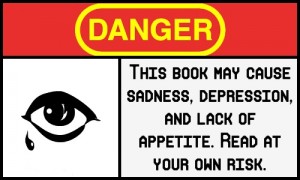It’s no surprise that the publishing industry is changing; pretty much everyone from the mailman to Aunt Gertrude can sense that bookstores aren’t what they were a decade ago. But what is the industry changing into? A butterfly, or a new form of ravenous beast? The summer’s greatest blockbuster for anyone following the industry was the feud between Amazon and Hachette Books, and just like most summer blockbusters, the show was filled with overproduced spectacle but ended in a fizzle. The behind-closed-doors resolution will impact the industry for years, and we may never know the specifics. Doubtless neither party walked away elated.
 I’m a terrible prognosticator; I believed the iPhone would fail, that Avengers would bomb at the box office, and Twilight would never be made into a movie. So if I predict that publishing will be usurped by the prescription drug industry, I’ll understand if you’re cautiously doubtful. Think about it: television ads for new books, complete with fast-spoken warnings! Announcers booming: “Bored with life? Looking for excitement? The latest John Grisham is exactly what you need, ask your bookseller for details! Side effects include: sleepless nights, plot confusion, and subjective exposition. Be sure to read in a well-lit environment, not everyone who reads John Grisham is a fan, paper cuts can be hazardous, always seek the advice of a bookseller before reading a John Grisham. Glaco-Driscoll takes no responsibility for any adverse reaction to John Grisham. Buy your copy today!”
I’m a terrible prognosticator; I believed the iPhone would fail, that Avengers would bomb at the box office, and Twilight would never be made into a movie. So if I predict that publishing will be usurped by the prescription drug industry, I’ll understand if you’re cautiously doubtful. Think about it: television ads for new books, complete with fast-spoken warnings! Announcers booming: “Bored with life? Looking for excitement? The latest John Grisham is exactly what you need, ask your bookseller for details! Side effects include: sleepless nights, plot confusion, and subjective exposition. Be sure to read in a well-lit environment, not everyone who reads John Grisham is a fan, paper cuts can be hazardous, always seek the advice of a bookseller before reading a John Grisham. Glaco-Driscoll takes no responsibility for any adverse reaction to John Grisham. Buy your copy today!”
Eh, I could be wrong.
Still, there are signs of industry transformation. For anyone who’s picked up a copy of Publisher’s Weekly in the last few years, the first thing you’ll notice is the rise of e-books. Amazon and Kindle get a fair share of credit – it was the original Kindle that ignited the e-reading craze. I’m disappointed that Amazon didn’t adopt one of the open electronic publishing formats, but opted to choose their own. Still, I can’t blame them – Jeff Bezos was interested in productization and market growth. Just look at Apple’s iPad sales to understand why; it’s all about user experience, which is far easier to govern when one vendor controls everything from content to presentation. What the Kindle started, the Nook and iPad have spread. Throw in phones and non-Apple tablets, you have more than a billion devices capable of accessing e-books. That’s a huge market hungry for content.
Which leads me to the second industry-sweeping change: self-publishing. In previous decades, self-publishing meant a writer had to invest in printing, handle distribution, and marketing in addition to everything else – writing a good book, ensuring proper grammar and punctuation, layout and design, etc. There were some authors who succeeded, but far more who lost huge investments. Consequently, an entire sub-industry of predators sprang up. There’s always a scavenger eager to separate a fool from his money, and book editing/printing services have always been on my list of “people I wouldn’t save if they were being mauled by a ravenous honey-badger”.
This too is something Amazon has helped changed; while it’s still far too easy for everyone’s Aunt Gertrude to hit the publishing “go” button, particularly with e-readers, print-on-demand has changed everything. The rise of LuLu, Amazon’s CreateSpace, and Café Press (among others) have created a path to publishing that requires little or no monetary investment. Amazon in particular has an interesting model; by leveraging their distribution arm, they’ve become a book packager, publisher, printer, and marketer to the point where they can compete with the major publishing houses. There has yet to be a mega blockbuster self-published book, but it’s likely just a matter of time at this point.
Where does that leave the working writer?
Over the next couple of months, I’ll be exploring the nuances of self-publication, including interviews with a few brave souls who made the leap, and their valuable advice for anyone considering their options.